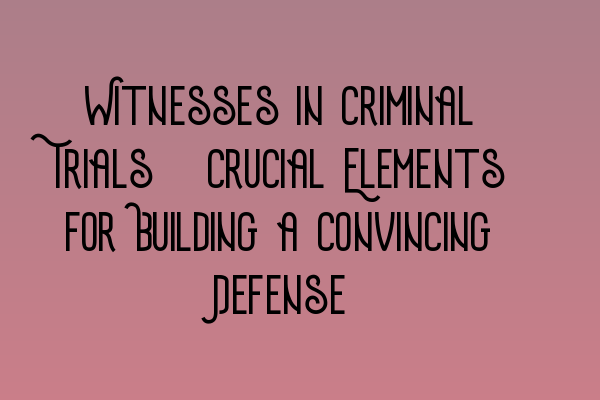Witnesses in Criminal Trials: Crucial Elements for Building a Convincing Defense
Building a strong defense in a criminal trial requires careful consideration of various factors. One of the most critical elements is the use of witnesses. Witnesses play an essential role in providing evidence and testimony that can significantly impact the outcome of a case. In this article, we will discuss the crucial elements for building a convincing defense using witnesses.
The Importance of Witnesses
Witnesses serve as the eyes and ears of the court. Their testimonies can provide invaluable insights into the events surrounding the alleged crime. Prosecutors may present their witnesses to prove the guilt of the defendant, while the defense can rely on witnesses to challenge the prosecution’s evidence and establish reasonable doubt.
When it comes to a convincing defense, witnesses can help establish an alternative narrative, challenge the credibility of the prosecution’s witnesses, or provide an alibi for the accused. Their presence can lend credibility to the defense’s case and sway the jury in favor of the defendant.
Choosing the Right Witnesses
Selecting the right witnesses is crucial for building a convincing defense. Ideally, defense attorneys should identify witnesses who can provide reliable and unbiased testimony, possess relevant knowledge of the events, or have expertise in certain fields that can strengthen the defense’s arguments.
For example, eyewitnesses who can testify about the defendant’s whereabouts during the alleged crime can be instrumental in establishing an alibi. Expert witnesses, such as forensic scientists or medical professionals, can provide specialized knowledge and analysis that challenges the prosecution’s evidence.
Furthermore, character witnesses can vouch for the defendant’s reputation and credibility, which can impact the jury’s perception of the accused. These witnesses can testify about the defendant’s good moral character, honesty, or peaceful nature.
It is essential to thoroughly evaluate potential witnesses to ensure their credibility and reliability. Conducting background checks and interviewing witnesses prior to trial can help the defense identify any potential weaknesses in their testimonies or uncover any biases that may compromise their credibility. This preparation is key to successfully building a convincing defense.
Preparing Witnesses for Testimony
Proper witness preparation is another crucial element in building a convincing defense. Witnesses need to be well-prepared to testify confidently and accurately in the courtroom. Defense attorneys should conduct detailed interviews with their witnesses to gather all relevant information and craft a strong defense strategy.
During preparation, witnesses should be familiarized with the trial process, including courtroom etiquette, questioning techniques, and potential cross-examination strategies. Attorneys should emphasize the importance of providing truthful and clear answers and help witnesses anticipate and navigate potential challenges or traps set by the opposing counsel.
Presenting Witnesses in Court
When it’s time to present witnesses in court, the defense team should carefully plan their order of appearance. The order should strategically highlight the most impactful and credible witnesses first, capturing the attention of the jury from the start.
Defense attorneys should also consider the overall presentation of witnesses. Dressing appropriately, maintaining a professional demeanor, and using effective communication skills are essential for creating a positive impression on the jury. Polished and well-organized witnesses can enhance the defense’s credibility and improve the persuasiveness of their testimonies.
Conclusion
Witnesses play a vital role in building a convincing defense in criminal trials. Their testimonies can challenge the prosecution’s evidence, provide alternative narratives, and establish reasonable doubt. By carefully selecting, preparing, and presenting witnesses, defense attorneys can significantly strengthen their case and increase the chances of a favorable outcome for the accused.
If you’re preparing for the SQE exams or need additional resources for your legal studies, be sure to check out these related articles:
- SQE 1 Practice Exam Questions
- SQE 1 Practice Mocks FLK1 FLK2
- SQE 2 Preparation Courses
- SQE 1 Preparation Courses
- SRA SQE Exam Dates
